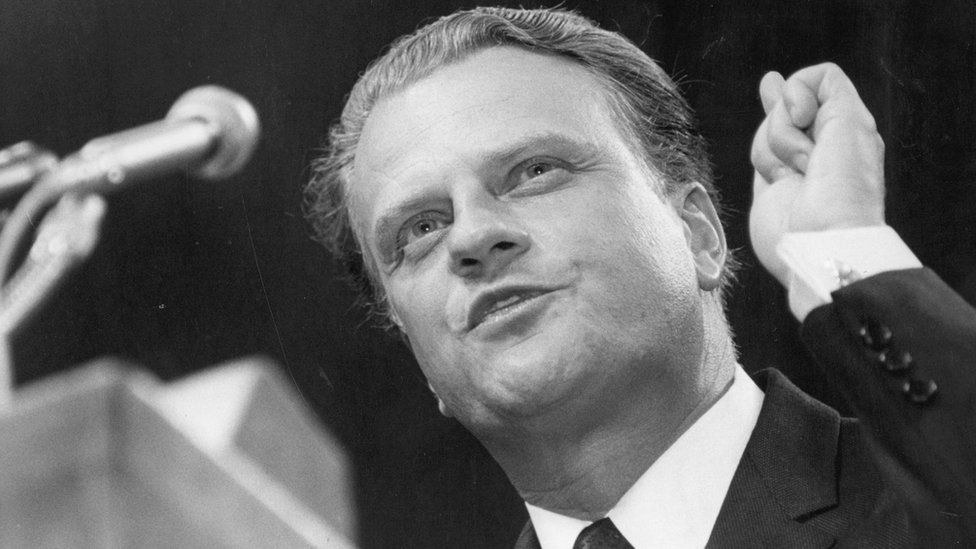Billy Graham: Six things he believed
- Published

The American evangelist Billy Graham, one of the most important religious figures of the past century, has died aged 99.
In a career spanning more than 60 years, he is believed to have preached to tens of millions of people in what he called his "crusades".
Here are some of the key things he believed and stood for throughout his life.
He was an early crusader for civil rights
At a time of racial segregation in the US, Graham said he would not speak before segregated audiences in the 1950s, and often spoke of the need for inclusion.
At one event in Tennessee in 1953, he moved ropes that divided black and white members of his audience.
"Christianity is not a white man's religion and don't let anyone tell you it's white or black," he told an audience in South Africa in 1973. "Christ belongs to all people."
Graham was also a close friend of Martin Luther King Jr, and once paid his bail when King was arrested at a demonstration in 1960.
Critics, however, argue that Graham did not push for legislative action, but for voluntary change, and that his support of Southern Baptist ministers could be interpreted as an endorsement of segregation.
It was important to reach out to strangers
In 1992, Graham became the first foreign religious leader to visit North Korea, where he met its ruler, Kim Il-sung. He returned two years later.
The family has close ties to the country - Graham's late wife Ruth, whose parents were missionaries, grew up in Pyongyang in the 1930s. She said that her time there constituted "some of the most memorable years of my life".
The visit, which saw Graham speak about his faith before a university audience, took place with the approval of President George HW Bush.
"I want to go as their friend," Graham said beforehand. "I want to see some of the positive things there, come out and report on them, because there has been so much negativism about North Korea."
The visit echoed others that Graham took as an unofficial US representative to countries that did not have warm ties with the US at that time. In 1984, he underwent a 12-day trip to the Soviet Union, even meeting Kremlin officials.
The Billy Graham rule
Or, as it is also now known, the Mike Pence rule.
The guidance on how to avoid even a hint of impropriety around women was created by Graham and three fellow evangelicals in 1948, and is based on Paul's advice to Timothy in the Bible.
It has since been adopted by evangelical current Vice-President Mike Pence.
"We pledged among ourselves to avoid any situation that would have even the appearance of compromise or suspicion," Graham said. "From that day on, I did not travel, meet or eat alone with a woman other than my wife."
It's possible to find hope in the darkest of moments
Speaking at the Washington National Cathedral three days after the 11 September attacks, Graham said he was struggling to find answers.
"I have been asked hundreds of times why God allows tragedy and suffering. I have to confess that I do not know the answer," he said, adding that the disaster was "a lesson about our need for each other".
"Now we have a choice - whether to implode and disintegrate emotionally and spiritually as a people and a nation; or to choose to become stronger through all of this struggle, to rebuild on a solid foundation."
Everyone could be saved - even a notorious gangster
One of the more intriguing episodes of Graham's life saw him befriend Los Angeles gangland boss Mickey Cohen.
They were introduced by a mutual acquaintance, wiretapper Jimmy Vaus, who had converted to Christianity after attending Graham sermons.
Cohen did not respond to Graham's overtures to convert, but the evangelist stood by him over the years, even reportedly suggesting the gangster could make an outstanding gospel preacher if he chose to follow that path.
Cohen did not take up the suggestion.
"My job is to try to win every person to Christ, especially persons that would have influence for Christ in our society," an optimistic Graham said after one of their meetings, even if Cohen was seeking only to improve his image through the association with Graham.
He regretted his involvement in politics
Billy Graham was close to many US presidents over the decades
For decades, Graham was a fixture of the White House and acted as an unofficial counsellor to presidents - Time journalist Nancy Gibbs once wrote that "he came with the office like the draperies".
While he tended to steer clear of endorsing candidates, he ended up becoming close friends with a number of presidents, in particular Lyndon Johnson and Richard Nixon.
Graham's relationship with Nixon even went as far as him advising the president on what action to take in Vietnam. He later supported Nixon throughout his scandals, but went on to denounce him.
In a 2011 interview with Christianity Today, Graham said he wished he had not become as involved in politics.
"I'm grateful for the opportunities God gave me to minister to people in high places; people in power have spiritual and personal needs like everyone else, and often they have no one to talk to," he said. "But looking back I know I sometimes crossed the line, and I wouldn't do that now."
In 2002, Graham apologised after tapes emerged of him and Nixon making anti-Semitic remarks, with the evangelist saying: "They don't know how I really feel about what they're doing to this country."
- Published21 February 2018
- Published21 February 2018